-Ryan J. Hodge
For someone who enjoys a great story, is there anything better than a narrative that engages you from the very start? Imagine a world so rich you can almost smell the scents in the air, a delivery so clever it forces you to think in a way you never thought you would. I’m Ryan J. Hodge, author, and I’d like to talk to you about…Video Games.
Yes, Video Games. Those series of ‘bloops’ and blinking lights that –at least a while ago- society had seemed to convince itself had no redeeming qualities whatsoever. In this article series, I’m going to discuss how Donkey Kong, Grand Theft Auto, Call of Duty and even Candy Crush can change the way we tell stories forever.
What videogames teach us about heroism
Understanding what makes a hero and what makes a villain is something that’s been impressed upon us since childhood. The hero does ‘good’, the villain does ‘evil’. The hero will save the princess where the villain will lock her up.
While you may see the narrative waters muddied a bit by having a hero with a checkered past, or a villain with a tragic backstory that led him on the path to what he became; it’s usually very clear who the author hopes the audience will root for. However, this can create its own set of problems. At times, characters can be presented as so infallibly good or so irredeemably evil, that the audience cannot even relate to them.
In The Hunger Games (Suzanne Collins, 2008), ‘proper’ society has found it acceptable to pit children against each other in annual death matches and, for some reason, does not view it as a despicable thing to do. Now this is, perhaps, somewhat explicable (the ancient world hosted similar events, after all); but what is more troubling is the fact that many of the ‘participants’ (whom are chosen at random) are not only adept but eager to be thrust into mortal combat –going so far as to mock those who plead for mercy.
This creates a situation where the animosity surrounding the circumstances of the Hunger Games so bogglingly unrelatable, that we as the audience are forced to immediately seize upon the only character who isn’t cackling at all the bloodshed. However; what we find in Katniss (as well as a large amount of ‘Young Adult’ genre heroes) is, despite her ‘hero’ status, situations are more likely to happen to her rather than because of her. She never truly embraces the culture of the Hunger Games (she fights defensively, she allies with weaker participants, and does not even consider winning the way she’s ‘supposed’ to), yet she still emerges the victor in this violent, decades-old tradition. In effect, she is able to emerge from this harrowing experience wiser, nearly unchanged as a character from the point we, as the audience, met her.
Here, videogames offer a crucial divergence in terms of audience relation to character. In a videogame, the player must participate in order to progress. He must embrace the game mechanics with no author to ‘protect’ him. Such a dynamic lends itself into situations where doing what is ‘morally correct’ is counter-productive to success and survival in the game world.
However, some games take it a step further and actually ask what the player would like to do next. Rather than assume every detail of the player’s motivation, the designers will leave it up to the gamer as to what sort of person –what sort of character- he wishes to be. The Pitt add-on for Fallout 3 accomplishes this point brilliantly. In brief: The Pitt presents two factions with which the player must choose one with which to ally himself; slavers and slaves.
Seems like an obvious choice, right? A ‘moral’ person will always side against oppression and join the slave rebellion. But an additional narrative kink is thrown into the works. As it happens, a baby has just been born that does not bear the mutations typical of denizens of ‘the Pitt’. Its blood represents a potential cure for the degenerative effects of living in the Pitt’s polluted and radioactive atmosphere. The only problem: its mother is a slaver and is none too keen to let her newborn out of her sight. So, in order to be the ‘good guy’; the player must kill an unsuspecting mother after winning the confidence of her husband and step over her still-bleeding corpse to spirit her newborn infant off to some slave resistance cell (who will do God-knows-what to it once they have it).
Alternatively, the player can side with the slavers, stamp out the resistance, and have a hand in rebuilding the nation’s lost railway infrastructure. True, the new system will be built atop the backs and bodies of slaves; but –given the other option- it may not seem quite as bad to everyone.
The debate can go back and forth about which school of ethics predicates which decision, but the simple decision to act in any case says much for the player’s ‘character’. However he chooses to rationalize his choice provides much information about his motivation and how likely he is to make ‘same-but-different’ decisions in future.
These rationalizations of difficult circumstances are critical to crafting memorable and compelling characters. Walter White of Breaking Bad (2008, TV Series) started his methamphetamine empire as a means to pay for cancer treatment after all. Yet, from these understandable (albeit non-laudable) beginnings, we see Walter devolve into a megalomaniacal criminal mastermind. We, as the audience, go from sympathizing with his goals; to peeking through our fingers as we wonder how it’s all going to come crashing down.
Indeed, it is fairly typical for the man of dubious means to become an anti-hero; but it’s rare when we are presented with such an individual as a full ‘hero’. Truly, it feels fairly dissonant when we recall that the founders who penned ‘All Men are Created Equal’ in their Declaration of Independence were by-and-large slave owners. Yet such facts are typically glossed over in the recounting of their story (at least when they are supposed to be sympathetic in its telling). Acknowledging that our heroes are capable of such cruelty often ‘clouds the message’.
Even in media where one would assume such concerns wouldn’t be an issue; we still see it. In Death Race (Date Remake), a story about convicts killing other convicts, great lengths are taken within the script to assure the audience that the protagonist character didn’t commit the crime of which he is accused. As the audience, we are therefore absolved from the ethically sticky conundrum of ‘rooting for a murderer killing other murderers’ as we instead ‘root for a wrongfully convicted man to go free’.
So we must ask “can an author truly create an unapologetic ‘hero’ while detailing evil deeds?” By this I mean: how do we create a protagonist who takes actions that he knows are morally wrong, have scant justifications, and still make him into a hero?
This War of Mine (2014) might offer a bit of insight. In TWoM, the player assumes the role not of a highly trained soldier, but of a small group of civilians trapped in a war-torn city. You do not fight for the government or the rebels; only to keep your people alive. But resources are scarce and charitable souls are even harder to find. This makes the player desperate from the outset. Too many days without food mean that everyone in your group starves. When you have no notion of from where your next meal may come, one cannot afford to pass up an opportunity to stock up.
This was precisely the position I was placed in when my scavenger ran across a relatively intact house occupied by an elderly couple. Their food stores were replete with enough stock to keep my group fed for just shy of a week. That kind of breathing room would be essential to fortifying our position and making other long-term survival strategies viable. This food would be a God-send…if not for the fact that taking it means these pensioners will likely starve or die looking for more.
What does a ‘hero’ do in this situation? There’s no way to convince the couple to trade with you, and no way to take them with you. Your group needs these resources if they’re going to survive the war. Does a ‘hero’ leave a bit behind, allowing the couple one or two last meals before the war consumes them? Does he demand the rest of his group go without for purposes of sentimentality alone? Does he take nothing and put his entire group at risk by pursuing less ethically questionable resources?
In this fashion, the player’s choices will all hurt somebody despite the fact that he is acting selflessly. Clearing the cupboards means the couple will starve. Leaving some behind means they will starve more slowly (and ensure that your group has less resources even after they’re dead). Taking nothing means your scavenger could easily be killed on another outing, leaving your group to suffer while these two geriatrics live in relative safety and comfort.
Futile sentimentality or brutal practicality? Intent or result? What makes for the stronger narrative hero? While the answer is up to the player or the author, either case presents a compelling argument for a character we might feel bad for, but won’t feel bad rooting for.
Now I’ve said much on heroes who act; who take matters into their own hands, who find a way to win. But there is perhaps a type of character who is made into a hero because he sacrifices. Sacrifice is different than simple action. Through action, or inaction, the hero knows he may lose something –may lose everything. But the thing he’s willing to sacrifice for is too precious to give up.
In The Dark Knight (2008, Film), two ferries; one carrying criminals, one carrying civilians, are fleeing the city. Unbeknownst to them, until already underway, they are both carrying explosives in their engine compartments. The Joker has given each vessel the detonator to the other’s bomb and bids either to activate the explosives within a few minutes or risk the destruction of both. This brilliant narrative element allows the majority of the audience to place themselves into the shoes of those on the civilian vessel. We ask ourselves “Why not destroy the boat full of criminals? Why would we allow the criminal boat to destroy us when they are of lesser value to society? Even if they choose not to destroy us, we all die anyway!”
The salient point here is that the civilians have been given every reason to destroy the other boat, and even take a vote in favor of destroying it. Yet, despite the danger, the Captain of the civilian boat chooses not to activate the detonator. Even when one of the passengers demands to be given the detonator instead, that passenger cannot bring himself to push the button.
Perhaps the most powerful aspect of this is how unlikely it is. It can be quite easily imagined that the crowd –even ourselves– could not press that button fast enough. However, these characters understood the danger. They understood the potential cost of their actions and chose sacrifice. In so doing, they may have elevated themselves above the audience. They turn into the sort of heroes we can aspire to be, rather than the sort of hero we fantasize about being (like the titular Dark Knight).
The theme of ‘sacrifice’ rarely translates to videogames. The player is trained from the outset to do everything he can to survive and avoid the worst outcome. Certain non-playable-characters may commit to heroic acts of sacrifice. In fact, even player characters may choose (in cutscene) to sacrifice themselves. However instances where the player himself is given the option to sacrifice himself –where options exist where he may not have to- are very rare.
Dragon Age: Origins (2009) is one such rare piece. In DA:O it is revealed to the player that slaying the ‘Arch Demon’ will, in turn, destroy the person who slays it (i.e.: YOU). The player is given a number of ‘outs’ for this, but these outs include: allowing the heir apparent to the land make the sacrifice instead. Alternatively, a witch will volunteer to ‘trap’ the soul of the Arch Demon within her yet unborn child (which you put there).
These are your options: take the hit yourself, leave the land without a king, or give your unborn child the soul of an Arch Demon. The decision is the player’s to make. I chose sacrifice, and that choice felt more meaningful –more heroic- because I didn’t have to make it.
It isn’t just difficult to be the hero; it’s difficult to even know how to be the hero. It’s one thing to fight against cackling imps and pillaging vandals, it’s another to know that your actions or inaction hurts someone who doesn’t deserve it. To know what sort of hero you’ll create should be informed by what sort of hero you’ll be. So draw your sword and enter the breach! Who knows? It just might make you a better writer.
Ryan J. Hodge is a Science Fiction author and works for Konami Digital Entertainment US (His opinions are his own). His latest book, Wounded Worlds: Nihil Novum, is available now for eBook & Paperback.
You can now follow Ryan on Twitter @RJHodgeAuthor


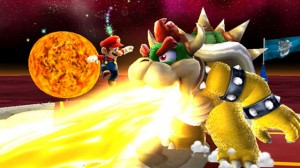

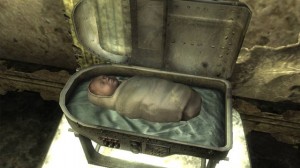

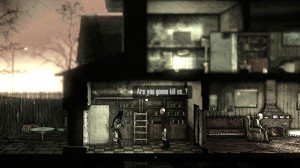
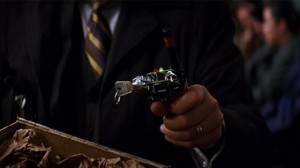
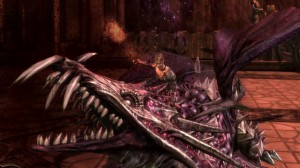
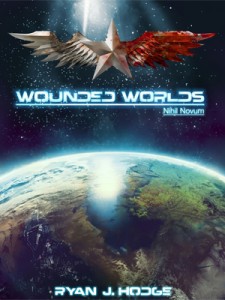
Hi it’s me, I am also visiting this web site on a regular basis, this web site is in fact nice and
the users are truly sharing pleasant thoughts.